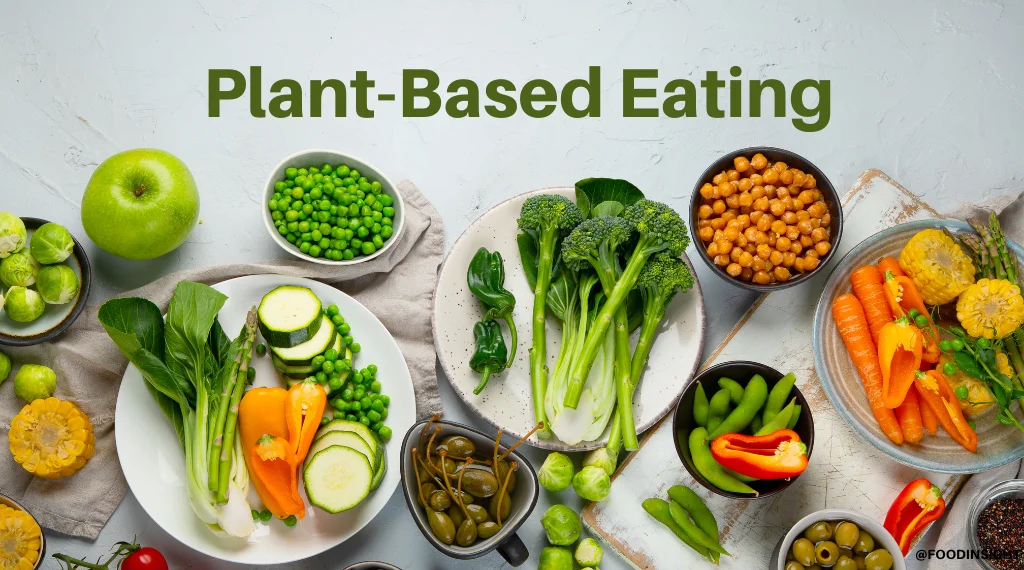What are plant-based diets
A plant-based diet primarily consists of foods derived from plants, including vegetables, fruits, grains, nuts, seeds, and legumes. This type of diet emphasizes plant-based sources for essential nutrients like vitamins, minerals, and fiber, which are crucial for maintaining overall health. Below is an overview of what a plant-based diet is and the benefits it offers:

Why Should We Use a Plant-Based Diet?
A plant-based diet provides numerous health benefits. It not only helps reduce the risk of chronic diseases but also promotes better weight management, heart health, and overall well-being. Here are some of the major advantages of a plant-based diet:
1. Helps with Weight Loss
Plant-based foods are typically low in calories and high in fiber, which can help regulate weight and reduce body fat. Fiber makes you feel full for longer periods, which prevents overeating. Studies have shown that individuals on plant-based diets tend to lose more weight than those on diets rich in animal products, largely due to the lower calorie density of plant foods.
2. Manages Blood Pressure
A plant-based diet has been shown to help lower blood pressure, reducing the risk of hypertension-related conditions such as heart disease, stroke, and kidney problems. Plant-based foods like fruits and vegetables are rich in potassium, which helps regulate blood pressure.
3. Prevents Diabetes
High-fiber plant-based foods help maintain stable blood sugar levels, reducing the risk of type 2 diabetes. These foods also improve insulin sensitivity, making it easier for your body to use glucose effectively.
4. Supports Longevity
People who eat plant-based diets often live longer due to the numerous health benefits, including better heart health, lower cancer risk, and reduced inflammation. Nutrient-dense foods like fruits, vegetables, and legumes contribute to overall wellness and help prevent age-related diseases.
5. Reduces Cancer Risk
Plant-based diets are rich in antioxidants, which protect cells from damage and reduce the risk of cancer. The fiber content in plant foods supports digestive health, while phytochemicals in certain plants act as protective agents against cancer.
6. Improves Cholesterol Levels
A plant-based diet helps lower LDL (“bad”) cholesterol and increases HDL (“good”) cholesterol, reducing the risk of heart disease. Fiber from fruits, vegetables, and grains binds to cholesterol, helping remove it from the body.
7. Minimizes Stroke Risk
Plant-based foods like fruits, vegetables, and whole grains reduce the risk of stroke by lowering blood pressure, improving cholesterol levels, and reducing body fat. Antioxidants in these foods also help minimize the risk of clot formation, a major cause of stroke.
8. Strengthens the Brain
Plant-based foods rich in antioxidants, vitamins, and healthy fats, such as nuts, seeds, and leafy greens, support brain health. Nutrients like vitamin E, magnesium, and omega-3s help protect brain cells and improve cognitive function.
9. Promotes Heart Health
Plant-based diets are linked to better heart health due to their lower saturated fat content. Fiber, antioxidants, and vitamins found in plant foods reduce LDL cholesterol and inflammation, which are major contributors to heart disease.
Conclusion
A plant-based diet is packed with complex carbohydrates, fiber, antioxidants, vitamins, and healthy fats that can help reduce the risk of chronic diseases like heart disease, cancer, and diabetes. It also supports brain health, promotes weight loss, and may even extend life expectancy. By incorporating more plant-based foods into your diet, you can achieve a healthier, more balanced lifestyle while minimizing the risk of many health issues.






